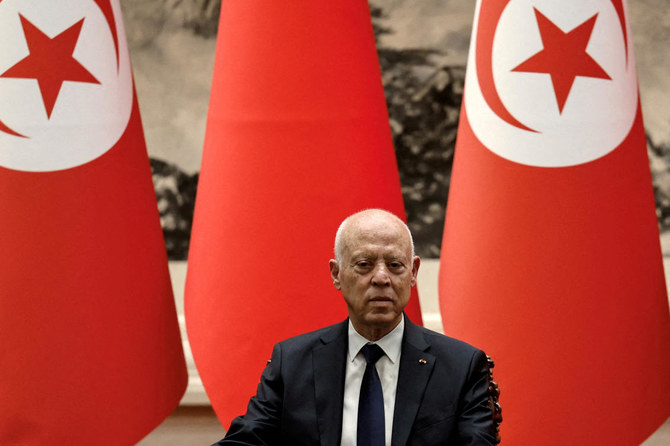
- ARAB NEWS
- 04 Jul 2025

TUNIS: Tunisian President Kais Saied, who seized wide-ranging powers two years after his 2019 election, on Monday submitted his official candidacy for the country’s upcoming presidential election on October 6.
Saied, 66, told reporters in the capital Tunis that his candidacy was part of “a liberation and self-determination war” set to “establish a new republic.”
Experts say Saied’s challengers face significant constraints in their bid to run for office, while several would-be hopefuls are either in prison or being prosecuted.
But Saied on Monday denied that his government was repressing critical voices, saying that “whoever talks about restrictions is delusional.”
“I did not oppress anyone, and the law applies to everyone equally,” he said. “I am here as a citizen to run for office.”
“We will not accept any foreign party interfering in the choices of our people,” he added.
Saied’s submission came just two days after that of Abir Moussi, a vocal critic of Saied who has been in jail since October.
Other jailed hopefuls include Issam Chebbi, leader of centrist party Al Joumhouri, and Ghazi Chaouchi, head of the social-democratic party Democratic Current, both held for “plotting against the state.”
The two politicians are among more than 20 of Saied’s opponents detained since a flurry of arrests in February 2023.
Last week, four women working on the presidential campaign of rapper turned businessman Karim Gharbi, better known by his stage name K2Rhym, were given jail time for allegedly buying signatures of endorsement.
Three staffers on media personality Nizar Chaari’s campaign have been detained on similar suspicions, which the candidate has categorically denied.
A group of about 30 NGOs denounced on Thursday the “arbitrary detention” of candidates, an electoral authority which has “lost its independence” and “the monopolization of the public space” to bolster Saied’s re-election bid.
“We are in a war of liberation and we don’t want to restrict anyone’s freedoms,” the president said on Monday. “I did not interfere with the judiciary.”
To be listed on the ballot, candidates are required to present a list of signatures from 10,000 registered voters, with at least 500 voter signatures per constituency.
Saied said he collected over 240,000 signatures.
AFP